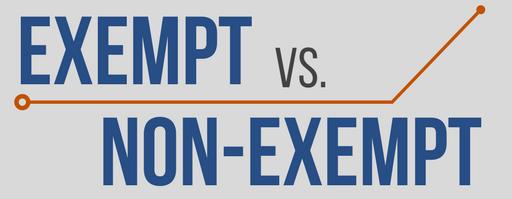
Misclassifying employees as exempt or non-exempt is a common problem in California, particularly regarding overtime pay. California labor laws dictate certain employee rights, including overtime pay, that can be affected by the classification of an employee as exempt or non-exempt. This article teaches the difference between exempt and nonexempt employees and what to do if you believe your employer has misclassified you.
What if my employer misclassified me as an exempt employee in California?
If your employer misclassifies you as an exempt employee, you may miss out on necessary rights and benefits to which you would be entitled as a non-exempt employee. This includes the right to overtime pay and meal and rest breaks. The misclassification may also prevent you from receiving other benefits, such as unemployment insurance and workers’ compensation.
The difference between exempt and non-exempt
In California, there is a difference between exempt and nonexempt employees. The classification of an employee as exempt or non-exempt is based on their job duties, the amount they are paid, and the way they are paid.
Exempt Employees
Under California labor laws on exempt employees, exempt employees are not entitled to overtime pay or meal and rest breaks. They are salaried employees performing executive, administrative, or professional duties. Exempt employees are usually paid a set salary and are not eligible for overtime pay, regardless of the number of hours worked.
Non-Exempt Employees
Non-exempt employees in California are entitled to overtime pay and meal and rest breaks. They are typically hourly employees who perform manual labor or other non-executive, non-administrative, or non-professional duties.
Non-exempt employees are usually paid an hourly wage and are eligible for overtime pay based on the number of hours worked.
Why would my employer intentionally misclassify me as exempt?
Employers may intentionally misclassify employees as exempt to avoid paying overtime or providing other benefits. This can be a cost-saving measure for the employer, but it can be detrimental to the employee. Employers may also misclassify employees due to a lack of understanding of California labor laws or by mistake.
Signs that an employee is misclassified as exempt
There are several signs that an employee may be misclassified as exempt. Some signs include:
- Being paid a salary but performing non-exempt job duties.
- Being denied overtime pay, even though you have worked more than 8 hours per day or 40 hours per week.
- Being denied meal and rest breaks, even though you have worked more than 5 hours daily.
- Being expected to work through lunch or breaks without receiving additional pay.
Can I be fired for complaining about misclassification?
It is illegal for an employer to retaliate against an employee for complaining about misclassification. You may have a claim for wrongful termination if you believe you have been fired, demoted, or subjected to other forms of retaliation for complaining about misclassification.
Can I sue my employer for misclassification?
If you believe you have been misclassified as an exempt employee in California, you have the right to sue your employer. You may be able to recover unpaid overtime and other damages, including interest and penalties. An experienced employment attorney can help you understand your rights and guide you through suing your employer.
Misclassifying employees as exempt or non-exempt can significantly impact the rights and benefits to which an employee is entitled. If you believe you have been misclassified as an exempt employee in California, it is crucial to understand your rights and take action. Consulting with an experienced employment attorney can help you understand your rights and navigate the legal process. It’s always recommended to take legal action in case of any illegal treatment to ensure fair compensation and prevent future violations of labor laws.